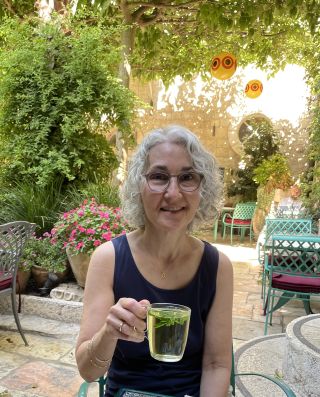Race and Ethnicity
Why I've Always Hated My Hair
A Personal Perspective: Othering and how it gets inside us.
Posted August 5, 2023 Reviewed by Devon Frye
Key points
- Othering is the process of making someone feel marginalized because they are different.
- People can be othered up-close, or by society at large.
- When we internalize othering, it affects our sense of self.
If I lived in Jerusalem, I would have perfect hair every day. Long, soft loopy curls. No frizz. No need for goop or gel. Just wash and go.
I learned this on a recent trip to Israel. It wasn’t the most important or most profound thing I learned on the trip. But it was interesting.
I’ve spent a lifetime hating my hair. It never did what it was supposed to do. As a child, I imprisoned it in braids. As a teen, I tortured it with blow-driers and flat irons. When it turned grey, I smeared it with what the hair industry calls “product” to make it behave.
In America, my frizzy hair made me feel unattractive. I longed for straight, smooth, blond hair that undulates like waves of corn. Instead, I had coarse, wiry hair that stuck out in odd directions. No one in my hometown knew how to cut it. I cursed humid days and never wore a hat. My hair was not made for the diaspora.

But in Jerusalem, none of that was necessary. My hair was home. Everywhere I looked I saw heads of hair that looked like mine. Long curls, short curls, brown curls, grey curls. Tight curls, loose curls. Curls on men, curls on women. Perfect curls, shiny in the Middle Eastern sun.
While I was there, I remembered two experiences I hadn’t thought about in a very long time. The first happened in fifth grade, when my teacher, eager to have us imagine the people of the “Cradles of Civilization,” suddenly pointed at me and said, “They had olive green skin—like Deborah!” I knew that I tended to tan rather than burn at the beach, but green? I ran to the bathroom to look. The fluorescent light gave me a celadon glow. I was horrified.
Seven years later, while studying Dostoevsky, I again had a teacher point at me to demonstrate the high cheekbones of “the Russian Steppes.” “You’re clearly from way, way East,” he quipped with a chuckle. “A veritable descendent of Genghis Khan.” I wasn’t aware that my cheekbones were so different from anyone else’s. But if he could see it across the room, surely everyone else could, too. And I knew it wasn’t a compliment.
Although I didn’t know it at the time, these were experiences of othering. Othering is “the experience of feeling marginalized and/or excluded because of visible differences from the population majority or dominant group” (DeWilde et al 2019). Were my teachers intentionally trying to make me feel othered? It doesn’t matter since that was the effect. Any comment or question that highlights difference can result in othering. For example:
Your hair has such an unusual texture.
What does that dot on your head mean?
Do you wear that scarf all the time?
These comments indicate that the speaker finds the person to be different than others. They can be made one-on-one or in a small group—like the comments of my teachers—or they can be broadcast from society at large—like the messages I got from TV and magazines. Either way, I internalized them, and they became how I felt about my hair—and myself—for much of my life. That’s how othering gets in and becomes part of who we are.
I’m a Jewish woman, whose family came, most recently, from Eastern Europe. In the U.S., most of us come from somewhere else, carrying gene pools designed for other climes. No matter our skin color, ethnicity, or religion, we compare ourselves to majority norms, affecting our sense of self and others. Any comment that highlights our differences can make us feel—at any age—that we don’t belong and that something about us just isn’t right.
I know I’m not green, and I’ve come to love my cheekbones. But without being aware of it, I grew up in an environment in which my hair and face were distinct. Others could see from afar that I was not part of the majority.
And it affected me. Even though I now see my face in the sepia photos of beautiful Jewish women in 1940s Berlin and Vienna and see my hair blend in seamlessly on the streets of Jerusalem, I still get the message in the U.S. that I just don’t look quite right. It took travel to realize that that was the result of a lifetime of othering. But the feelings have always been there.
References
.
DeWilde C, Carrington J, Abbate A, Burton CW, Bearman G, Salyer J. Structural Stress and Otherness: How Do They Influence Psychological Stress? Journal of Transcultural Nursing. 2019;30(5):478-491. doi:10.1177/1043659618823915


